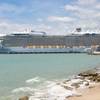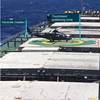Marine Casualty
Insights on an Investigation’s Problems and Pitfalls
When a vessel-related accident occurs on the navigable waters of the United States, the investigation machinery starts up almost immediately. The operator, owner, or person in charge of a vessel involved in such a casualty is obliged to give the soonest practicable notification, often followed by a written report, to the local Coast Guard Sector or office. This begins a process in which livelihoods, liberty, and civil liability might all be at stake. Careful thought is required when the Coast Guard investigating officer calls to request an interview.
The requirements to notify the Coast Guard of the occurrence of an incident are laid out in Subpart 4 of Title 46 of the Code of Federal Regulations. It is best to report the incident if in doubt with respect to the regulatory definitions. For example, the federal regulations require reporting a casualty resulting in property damage in excess of $25,000. (46 CFR 4.05-2(a)7.) Unless little more than scratching of paint occurred, it would be wise to immediately notify the Coast Guard rather than wait for the estimate of a marine surveyor. Giving the Coast Guard an immediate notification of the basic facts of the occurrence and the extent to which the marine environment or personnel remain at risk is the best policy. There is little if any downside to simply reporting the incident, except perhaps some amount of operational delay. Even if a written CG-2692 needs to be submitted, there is no need to give a detailed self-incriminating statement. And, except to the extent that the vessel owner determines that people directly involved in the incident had used alcohol or drugs, there is no binding requirement to make any admission or to draw any conclusions as to fault for the accident.
Once the Coast Guard’s investigation begins, however, the decision as to whether or not to give a full statement is not so simple. Traditional wisdom had been that refusing to cooperate with the Coast Guard would be tantamount to an admission of fault and that the best way to convince the Coast Guard that the mariner’s actions were reasonable and lawful would be to accept the opportunity to tell his or her side of the story. This instinct is strongest in a situation where the Coast Guard is investigating the matter informally, because the investigating officer will often have interviewed other witnesses or interested parties without allowing the mariner or his/her counsel an opportunity to participate. The inclination in those circumstances would be to give the Coast Guard a full statement because of the need to rebut statements made by others, which presumably pointed the finger at the mariner.
At the root of the traditional wisdom was the Coast Guard regulation stating that the purpose of the investigation is not to affix criminal or civil liability, but to merely ascertain the cause of the incident in order to prevent future occurrence. (46 CFR 4.07-1(b)). The regulations also contain a form of limitation with respect to the admissibility of the mariner’s statement: “In order to promote full disclosure and facilitate determinations as to the cause of marine casualties, no admission made by a person during an investigation…may be used against that person in a [license suspension and revocation] proceeding, except for impeachment”. (46 CFR 5.101(d)). This provision seems to assure mariners that their statements would not come back to haunt them in subsequent proceedings against their licenses. It was also thought that cooperation with the Coast Guard is relatively harmless because the final report of the Coast Guard’s investigation cannot be used in a civil lawsuit to affix liability. (46 USC §6308; but see L. Lambert, The Use of Coast Guard Casualty Investigation Reports in Civil Litigation, 34 J. Mar. L. Comm. 75 (2003))
The protections which these regulations and statutes seem to afford are flimsy, however. First of all, neither of these protections come into play if evidence of criminal behavior is uncovered. The Coast Guard is duty-bound to notify the local U.S. Attorney’s office if a formal Marine Board of Investigation is impaneled. Moreover, the Coast Guard is legally required to present any evidence of criminal conduct uncovered in its investigation to the U.S. Attorney General. Therefore, even if a statement made to the Coast Guard might not be directly useable as evidence in a suspension and revocation proceeding or as evidence in a civil trial, such statements or evidence might be directly used in a criminal prosecution. Coast Guard investigating officers are fully familiar with the Miranda rule, but an investigation interview setting would not be considered to be an arrest or apprehension situation such as to make the Miranda warning necessary.
And one should not underestimate the imagination or willingness of the U.S. Attorney General or the local U.S. Attorney’s Office to craft a criminal indictment out of the facts of a marine casualty. Certainly when a death occurs, the federal law known as the “Seaman’s Manslaughter” statute (18 USC §1115) can come into play because a conviction requires proof of only simple negligence, rather than intent or recklessness. Oil pollution incidents can readily lead to federal criminal indictments also. An oil pollution incident is likely to be well publicized, which will bring pressure upon the U.S. Attorney to take action. The Migratory Bird Treaty Act, passed almost 100 years ago in order to prevent hunting, has been used in one oil spill case after another against the individual mariners or their employers because the statute requires only a showing of the killing of a bird without proof of intent or even negligence. (16 USC §703). Even in the “run-of-the-mill” collision, allision, or personal injury case, the operator or person in charge of the vessel could potentially be subject to criminal punishment. Title 46 of the United States Code contains a provision which makes it a Class A misdemeanor to “operate a vessel in a grossly negligent manner that endangers the life, limb or property of a person.” (46 U.S.C. § 2302(b)). The line of separation between gross negligence and simple negligence is a matter of degree and is not always easy to define. Ultimately, it could be left to a jury to decide whether or not the mariner’s behavior was so negligent as to constitute the “willful, wanton disregard of a known risk”. Therefore, the possibility always exists that a statement voluntarily made to the Coast Guard could be used in a criminal trial. This is not the only potential pitfall associated with cooperating in an investigation, however. The regulation which bars the use of admissions in a suspension and revocation hearing contains an exception for purposes of “impeachment”. If the mariner decides to make a statement to the Coast Guard but then changes his/her story in front of the presiding Administrative Law Judge, the Coast Guard will be able to point out the inconsistency of a statement made during the investigation. Moreover, the word “admission” is subject to a narrow definition. The Coast Guard could well argue that a statement with respect to the facts of the event is not necessarily a direct admission of fault and therefore can be utilized as evidence. The mariner may not have directly admitted fault for the casualty, but that will not stop the Coast Guard from arguing that the facts of the event, as evidenced by the mariner’s own statement, should lead the ALJ to conclude that the mariner was negligent.
Any statements made to an investigating officer, whether amounting to an admission or not, can be used to assess liability for civil penalties. The federal statutes allow for imposition of a civil penalty of $5,000 for every proven breach of the Inland Navigational Rules (33 USC §2072 (a)) and $25,000 for every instance of negligent navigation (46 USC §2302(a)). There is nothing in the law or the regulations to prevent the Coast Guard from using any statement given in an interview to support its assessment of those civil penalties.
Finally, there are certain licensed mariners, specifically state-licensed pilots, who might not worry about their licenses in the context of a Coast Guard investigation. If the pilot was operating under the authority of his state license rather than his federal license at the time of the incident, the Coast Guard cannot suspend or revoke his federal license. However, there is no specific regulation or statute which prohibits Coast Guard cooperation with state licensing authorities. In other words, any statement made to the Coast Guard could very well be transmitted to the state licensing authority. The administrative procedures in place under state law would then be the only possible protection from the use of those statements by the Board of Pilot Commissioners to suspend or revoke the pilot’s license.
All of the above having been said, the decision whether or not to cooperate with the Coast Guard should be made on a case-by-case basis.
There may very well be instances in which a full exposition by the mariner may convince the Coast Guard that no further inquiry or investigation need be made and/or that no negligence or breach of the rules of the road took place. Being human, Coast Guard investigating officers and their superiors in the chain of command may be highly suspicious of a mariner who absolutely refuses to cooperate. But the mariner’s decision must be made with the presumption in mind that any statement given to the Coast Guard will be fully admissible in suspension and revocation hearings, civil penalty hearings and criminal trials.
Jeffrey Moller, partner at Blank Rome, is an experienced maritime law practitioner who has parlayed his tort litigation experience into successful representations in shoreside toxic tort and environmental contamination cases. Mr. Moller has received the highest possible rating from Martindale-Hubbell. [email protected]
(As published in the October 2012 edition of Maritime Reporter - www.marinelink.com)











